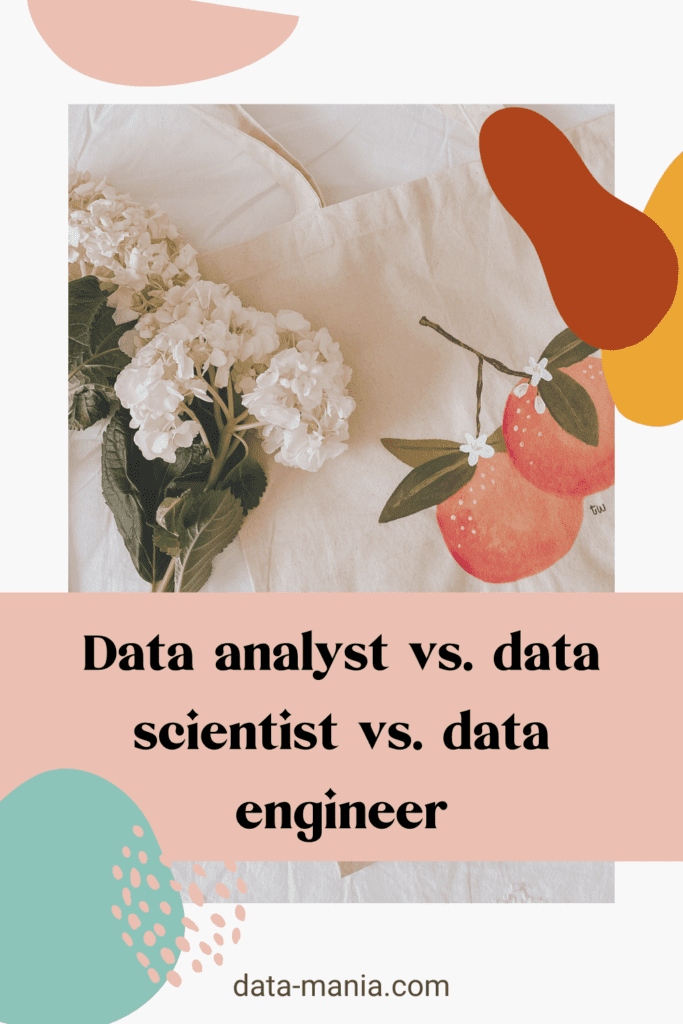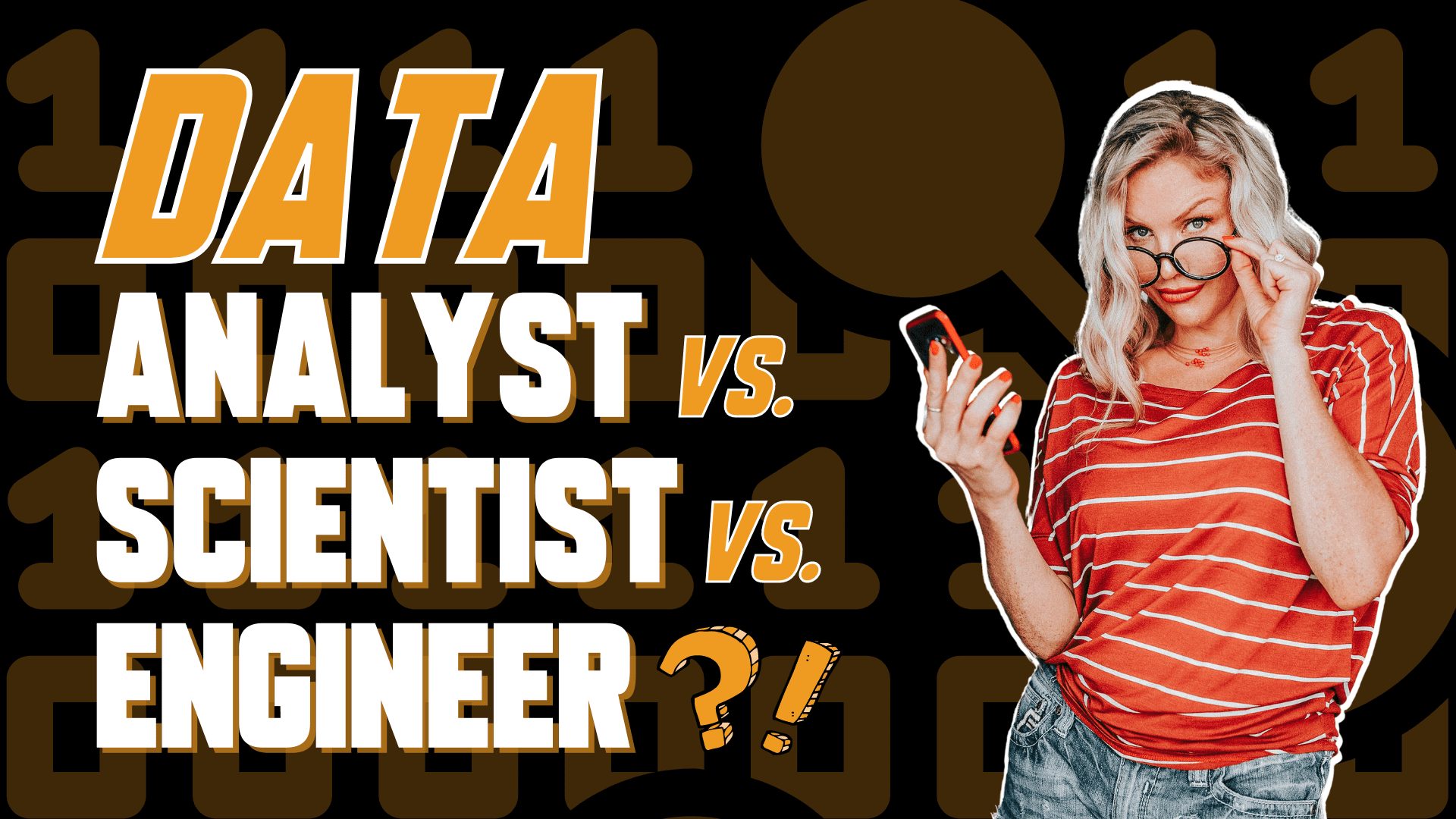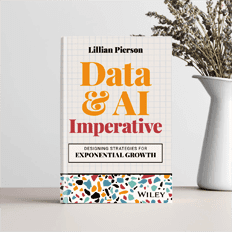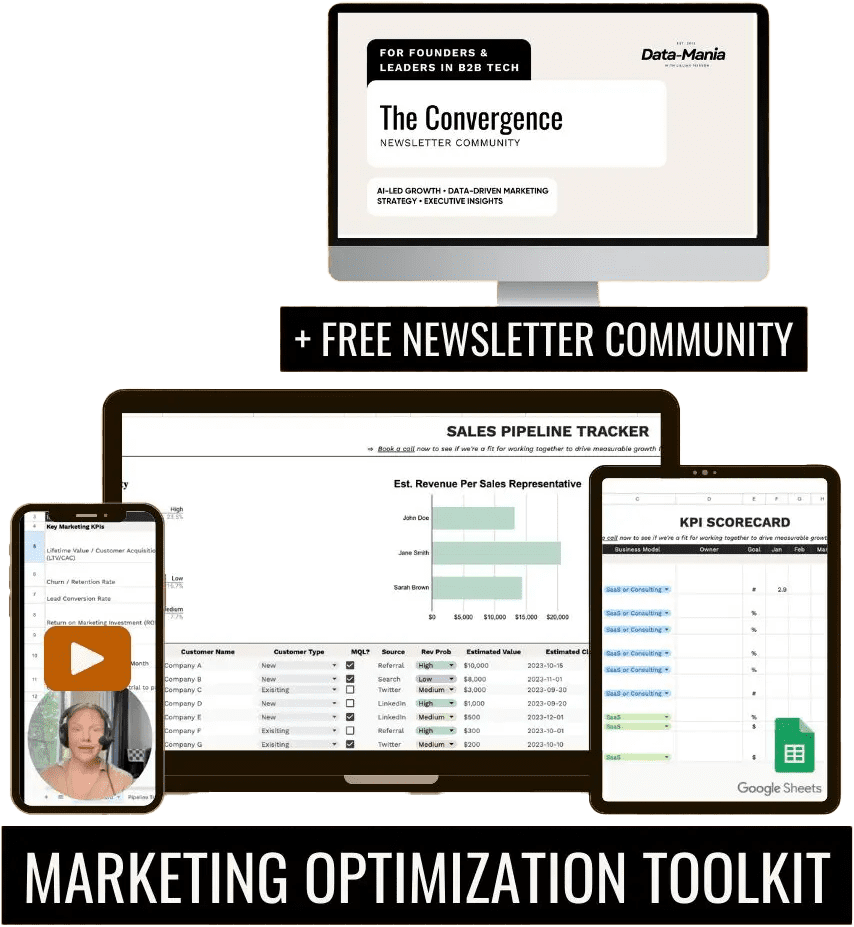Data analyst vs data scientist vs data engineer – deciding whether you should pursue any of these three roles? In this article, I’m going to share with you all the insider info about what each role requires. This includes some REALLY important things you should consider about yourself before choosing between them!
YouTube URL: https://youtu.be/DVOvRM7r3gM
If you prefer to read instead of watch then, read on…
For the best data leadership and business-building advice on the digital block, subscribe to my newsletter below and I’ll make sure you get notified when a new blog installment gets released (each week). 👇
[convertkit form=5131701]
Let’s start with the skills and requirements real quick…
Requirements & Skills
Data Engineer
If you want to become a data engineer, a bachelor’s degree will suffice but you’ll need something in Science, Technology, Engineering and Math (STEM) to be one.
Data engineers generally program in Java, C++, Scala and they also need to know Python and SQL.
You should have experience building systems in a distributed computing environment with prior experience using tools like Hadoop, Gurobi, Hive, Spark, MySQL, and Map/Reduce. While you don’t necessarily need to be a data architect, you should have some experience doing data architecture-level tasks.
Data Scientist
 In terms of data science, there’s a whole different set of requirements for that. Of course, you still need to have a STEM degree but you don’t necessarily need to have a PHD or Master’s degree.
In terms of data science, there’s a whole different set of requirements for that. Of course, you still need to have a STEM degree but you don’t necessarily need to have a PHD or Master’s degree.
According to KDnuggets, 12% of Data Scientists hold only a BS degree and 88% hold a master’s degree or PhD. KDnuggets also reports that 32% of data scientists hold degrees in mathematics and statistics, while 19% hold computer science degrees, and 16% hold engineering degrees.
In terms of languages, data scientists need to have skills in both Python and R as well as SQL, at least.
With respect to experience, you’ll need to have experience with all sorts of analytical methodologies. You should know how to do data mining, use random forest, text mining, network analysis – all of that good stuff. Of course, you need to be really well-experienced with all of the various machine learning algorithms which includes deep learning, artificial neural networks, classification, clustering, etc. Then, you’ll need to have a very solid competency in statistics (if you don’t have a degree in that). And, because most of your machine learning models will be brought into production in a distributed computing environment, you need to know how to work in that environment as well.
You also need to have great communication skills which includes data storytelling as well as presentation skills. You’re not only expected to be able to uncover and deliver accurate predictive insights from data, but you also need to be able to communicate what those insights mean to the actual business. That’s the gist of what a data scientist does.
Data Analyst
Data Analysts also need to have a STEM degree – it would be difficult to get hired as a data analyst without it.
Actually, maybe a data analyst now would have been considered a data scientist back, say five years ago, it’s just that the bar keeps getting raised in terms of “what qualifies as data science.”
The data analyst role is kind of like a minor in data science. I would actually say that a data analyst is almost the same level of a junior data scientist. So, you’ll need to know R, Python, SQL and advanced statistical knowledge and expertise. You also want to have strong analytical capabilities, reporting acumen, ability to manage multiple priorities and rock-solid communication skills.
These are the differences in roles between data analyst vs data scientist vs data engineer.
Actually, I would love to hear from you – tell me in the comments:


Now let’s talk about what each of these types of professionals does…
Role Responsibilities
Data Engineer vs Data Scientist
A data engineer actually builds and maintains data pipelines. Let’s try to understand the difference between data science and data engineering by thinking of a water system.
You get tap water running to your house that’s been cleaned – so it comes from the plants and goes through the pipes. Engineers are the ones who actually designed the conveyance system: they sized the pipes, they built the treatment facility and all of the stuff that gets the water to the end consumer. That process can be pretty much equated with data engineering.
A data engineer builds the pipelines, storage or repository – they build everything that’s required to store, move and consume the data.
Now, the data scientists are consumers of the data. They take that data and they use it to make predictions, create dashboards in all sorts of analytics platforms to help support the business in a wide variety of ways.
In short, the data scientists consume the data while the data engineers build and maintain the systems that deliver the data to the data scientists and to the data analysts, for them to use.
Data Scientists vs Data Analysts
The data analysts are also consumers of that data. But they’re using it more like an ad hoc to answer questions for the business. They’re not actually building decision engines for predictive applications. So, the more sophisticated type model-building is the realm of data scientists, whereas data analysts are more about figuring out what the data says and getting that information to the decision makers across the organization.
Data analysts write SQL queries, create data visualizations and dashboards. But, it’s generally always the simpler type of analytical work compared to the work of a data scientist.
If you’ve made it to this point and you find yourself leaning more towards the data scientist role, then you’ll probably love a recent video I just did on the data science career path and all of the killer opportunities available upon it. Check it out here.
Your Earning Capacity
In all honesty, there is a lot of BS out there about how much you’ll make in these roles. But I just did the research over on Indeed for average salaries in the US, and this is what I found:
Data Engineers are making between $60k – $75k per year, Data Scientists are in the $75k – $120k per year range and Data Analysts make between $60k – $75k per year.
Just know that these are just the average compensation. So, with either of these roles, there are multiple ways to evolve into multiple six-figure compensation packages.
I’ll tell ya more about that in a second…Let’s first discuss personality.
Your Personality
It may seem odd to talk about your personality when we are discussing whether you should choose to be a data engineer, a data scientist, or a data analyst. But honestly, YOU MATTER.
Here’s the deal: you can get all the data scientist or all the data engineering skills you want, but when the rubber hits the road and it’s time for you to work in that capacity, if that role is not compatible with your personality type, it DOES NOT MATTER how much money they throw at you, you’re not gonna be happy doing that.
If you’re not happy doing that work, you’re not going to thrive as a professional. Also, you’re not going to serve in your highest capacity as a human being. So, you want to make sure that the work you do on a daily basis is not only in support of the company you work for, but in support of your constitutional makeup – your personality, your mission in life and what you’re really passionate about. Going after these roles just because you have tech skills and there’s great pay may be a little short-sighted in the end.
I know because I did that back in 2012…
When I had the skills and opportunities, I realized that I would not enjoy being a data scientist AT ALL. I need to do something where I can see a visceral positive impact from my work. I need to feel like I am having a positive impact on the lives of others. In order to feel that, I need to be in a lot closer contact with people than a data scientist role can offer me.
So, instead of going for that second interview with Facebook for a data implementation position, I literally chose to move to Thailand and boot-strap my own online data business from almost scratch. That was almost 8 years ago and we’re WAY past the bootstrap phase now – but I am a data entrepreneur personality type. And I have been able to use my data science skills to impact the lives of millions of people since then – while earning great money.
So the thing is: Thinking of this in terms of “Do I become a data analyst, a data engineer or a data scientist?” is limited thinking – you have far more opportunity in the data field that’s available to you than just these roles. And, you can take a much more direct path to the top once you understand how to leverage your skillsets, your talents, your personality and your passions in order to serve in a capacity where you’ll thrive. That’s why I’m encouraging you to take the data superhero quiz.
It’s a free and super-fun 45-second quiz that’s all about you! It tells how your personality type aligns with the very best career path for you. It’s fun, free and it will provide you personalized data career recommendations! It’s complete with potential roles that fit your unique skills and passions, as well as salaries associated with those roles.
Take the Data Superhero Quiz today!
Hey! If you liked this article about data analyst vs data scientist vs data engineer, go ahead and show the love! Share it and leave a comment! Tell me which of these 3 roles seemed the best fit for you and why.
NOTE: This description contains affiliate links that allow you to find the items mentioned in this article at no cost to you. While this blog may earn minimal sums when the reader uses the links, the reader is in NO WAY obligated to use these links. Thank you!





